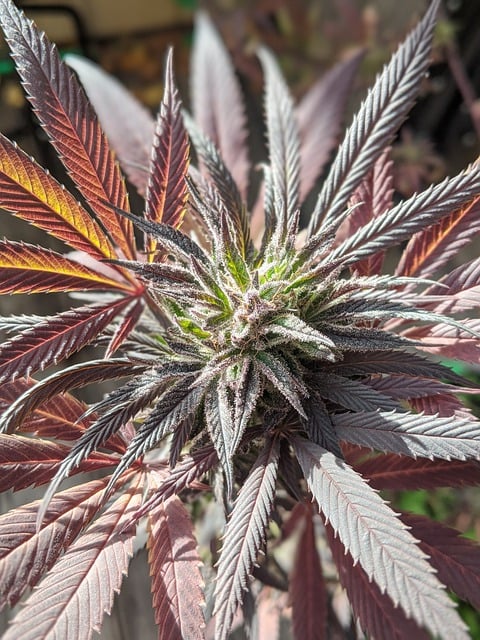Recent lab reports on THCA flower have highlighted its non-psychoactive properties and potential therapeutic benefits, setting it apart from its psychoactive counterpart, THC. These studies suggest that THCA may offer health advantages such as anti-inflammatory, antioxidant, and neuroprotective effects without causing mind-altering side effects. The presence of specific cannabinoids and terpenes in THCA flower appears to work synergistically to address pain management, reduce anxiety, and alleviate symptoms associated with neurodegenerative diseases. The comprehensive analysis of its composition, as detailed in the lab reports, offers a scientific basis for exploring the broader implications of THCA flower in holistic health practices. As research progresses, the therapeutic potential of THCA flower continues to be an area of significant interest and investigation.
Explore the burgeoning landscape of natural wellness with our latest feature, “Through the Lens of Science: Unveiling the Therapeutic Properties of THCA Flower.” This insightful article delves into the benefits of THCA flower as corroborated by comprehensive lab reports. We dissect the science behind this emerging therapeutic option, offering a clear and evidence-based understanding of its potential applications. Join us as we explore “The Science Behind THCA Flower: A Deep Dive into Lab-Validated Benefits and Potential Applications,” ensuring you are well-informed on the topic.
- Unveiling the Therapeutic Properties of THCA Flower: An Analysis of Lab Reports
- The Science Behind THCA Flower: A Deep Dive into Lab-Validated Benefits and Potential Applications
Unveiling the Therapeutic Properties of THCA Flower: An Analysis of Lab Reports
Lab reports on THCA flower, the raw form of tetrahydrocannabinolic acid, have shed light on its potential therapeutic properties. These scientific analyses reveal that THCA possesses a unique profile that may offer health benefits without the psychoactive effects associated with its decarboxylated form, THC. The initial findings suggest that THCA interacts with the body’s endocannabinoid system, influencing various physiological functions and potentially alleviating symptoms of certain conditions. For instance, studies indicate that THCA may exhibit anti-inflammatory, antioxidant, and neuroprotective effects. The lab reports detail the presence of specific cannabinoids and terpenes in the THCA flower, which contribute to its therapeutic potential. These compounds work synergistically, offering a broad spectrum of benefits that are currently under investigation for their implications in pain management, anxiety relief, and the mitigation of symptoms associated with neurodegenerative disorders. As research continues, the lab reports provide a solid foundation for understanding the therapeutic properties of THCA flower, highlighting its promising role in holistic health practices.
The Science Behind THCA Flower: A Deep Dive into Lab-Validated Benefits and Potential Applications
Laboratory analyses have shed light on the therapeutic potential of THCA, or tetrahydrocannabinolic acid, a non-psychoactive cannabinoid found in the Cannabis sativa plant. These lab reports on THCA flower, a form of raw cannabis that retains its acidic form, have provided compelling evidence of its benefits, which are gaining recognition within the scientific community. THCA is known for its anti-inflammatory properties and may offer relief from chronic pain without the psychoactive effects associated with its more well-known counterpart, THC. The cannabinoid’s interaction with the body’s endocannabinoid system has been observed to influence various physiological processes, including mood regulation and immune response.
Furthermore, the lab reports confirm that THCA flower may exert neuroprotective effects, potentially benefiting individuals with neurological disorders. Studies have indicated that THCA could play a role in inhibiting tumor growth and showing antiemetic qualities, although more research is needed to fully understand its efficacy in these areas. The potential applications of THCA flower are broad, ranging from pain management and anxiety reduction to the support of general health and well-being. As scientific investigation continues, the body of evidence supporting the lab-validated benefits of THCA flower is expected to expand, offering new avenues for natural health remedies.
THCA flower, a non-psychoactive cannabinoid found in hemp and cannabis plants, has garnered significant attention due to its therapeutic properties. The comprehensive analysis of lab reports and scientific exploration into its benefits reveal promising potential applications for wellness and health. As the body of research continues to expand, the findings from these rigorous studies underscore the value of THCA flower as a natural alternative for those seeking relief or enhanced well-being. Lab-validated benefits suggest that this compound holds significant promise, making it a noteworthy subject for further investigation in the realm of holistic health and medicine.


